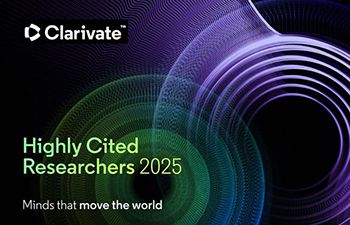People news
List of world’s most highly cited researchers features Sussex academics
Posted on behalf of: University of Sussex
Last updated: Wednesday, 19 November 2025

This year’s Clarivate Highly Cited Researchers list was published last week, with four University of Sussex academics named in the list, plus one from the Institute of Development Studies.
Clarivate, a global provider of business intelligence and bibliometrics, publishes an annual list of researchers whose contributions have demonstrated broad and significant influence in their fields. Evaluation and selection draws on the Web of Science Core Collection to identify those with a global influence in their fields. Each researcher selected has authored multiple Highly Cited Papers which rank in the top 1% by citations for their fields and publication year in the Web of Science over the past decade.
The Sussex researchers named in the 2025 list are:
- Professor Benjamin Sovacool (University of Sussex Business School)
- Professor Dave Goulson (School of Life Sciences; Faculty of Science, Engineering and Medicine)
- Professor Felix Creutzig (University of Sussex Business School)
- Dr Florian Kern (formerly University of Sussex Business School)
- Professor Ian Scoones (Institute of Development Studies)
Professor Maria Fasli, Pro-Vice-Chancellor (Research & Innovation), said: “The Clarivate Highly Cited Researchers list is widely regarded as one of the most significant indicators of research influence, so I am delighted to see our researchers at Sussex and partners featuring this year amongst the world’s most influential researchers. As detailed in our new strategy, Sussex 2035: Creating Progressive Futures - flourishing, sustainability and progress for the whole world, we aim to undertake excellent research and develop partnerships to promote global knowledge equity, and having highly cited researchers amongst our faculty demonstrates how Sussex is at the forefront of driving innovation in disciplinary research. My congratulations to those listed.”
Dave Goulson, Professor of Biology, who features on the list for the ninth consecutive year, said: “I’m delighted and honoured to feature once again in this list. It is great that research on insects and their plight garners such interest. As always, the credit really belongs with my excellent PhD students and postdocs.”
Felix Creutzig, Professor of Innovation and Policy Acceleration, and Chair of the Bennett Institute for Innovation and Policy Acceleration, said: “Recognition by Clarivate’s Highly Cited Researchers list is a huge honour, but citations are not the end goal. What matters is that the underlying science, in my case climate mitigation research, helps governments, cities and businesses cut emissions faster and protect vulnerable communities from escalating climate impacts.”
Benjamin Sovacool, Professor of Energy Policy at the Bennett Institute for Innovation and Policy Acceleration, said: “Despite the odd sounding name, the Clarivate list of highly cited scholars is the Michelin star of academia – extremely difficult to get on, but reputation changing if you do. It is a humbling experience to be on this list with so many great colleagues, and affirming to see the work we do have such large, international impact.”
Dr Florian Kern, Head of Ecological Economics and Environmental Policy at the Institute for Ecological Economy Research in Germany, and former Associate Faculty at the Science Policy Research Unit (SPRU) in the University of Sussex Business School, said: “I am deeply grateful for the University of Sussex’s supportive and nurturing research culture. Achievements such as these are only possible when you are part of tightly-knit, supportive and innovative research communities, such as the Sustainability Transitions Research Network.”
Ian Scoones, Professor of Resource Politics and Environmental Change at the Institute of Development Studies, located on the University of Sussex campus, said: “It’s great that this list recognises international, interdisciplinary, and engaged social science research, which is too often neglected in research assessments. Of course, individual citation scores reflect sustained collaborative teamwork and the efforts of many people. In my case this is especially long-term research partners in Africa, as well as the team involved in my European Research Council Advanced Grant work on pastoralism and uncertainty over recent years.”